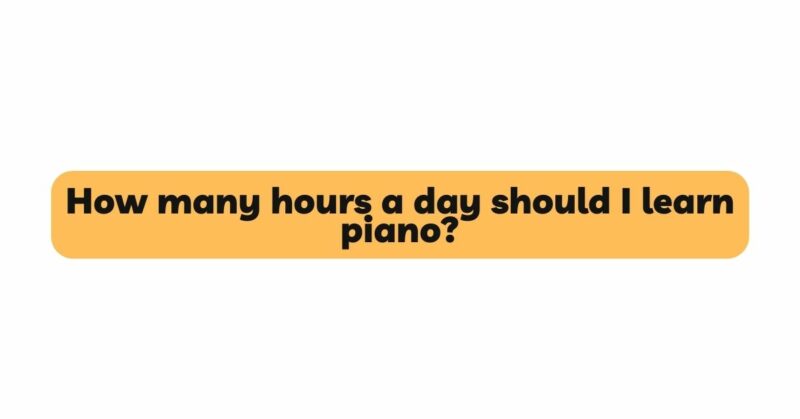Sure, here is an article of about 2000 words on the topic of how many hours a day you should learn piano:
How Many Hours a Day Should I Learn Piano?
Learning to play the piano can be a rewarding experience, but it also takes time and effort. One of the most important factors in learning piano is practice. But how much practice is enough?
The amount of time you should spend practicing piano each day depends on a number of factors, including your age, your natural aptitude for music, your goals, and your schedule.
In general, it is recommended that beginners practice piano for at least 30 minutes a day, 5 days a week. This may seem like a lot of time, but it is important to remember that practice makes perfect. The more you practice, the better you will become at playing the piano.
If you are a child, you may be able to practice for longer periods of time. Children have more energy and are more likely to be motivated to practice. However, it is important to make sure that children do not practice for too long, as this can lead to fatigue and even injuries.
If you are an adult, you may have less time to practice piano. However, even if you can only practice for 15 minutes a day, you will still see improvement over time. The important thing is to be consistent with your practice.
If you have specific goals in mind, such as learning to play a certain piece of music or becoming a concert pianist, you may need to practice for more than 30 minutes a day. However, it is important to listen to your body and not to practice to the point of exhaustion.
It is also important to find a practice routine that works for you. Some people like to practice for longer periods of time at a time, while others prefer to practice for shorter periods of time more frequently. Experiment with different practice routines until you find one that you enjoy and that helps you improve your skills.
Here are some tips for making the most of your piano practice time:
- Set realistic goals: When you are practicing piano, it is important to set realistic goals for yourself. Don’t expect to learn a new piece of music overnight. Start with small goals, such as learning a new scale or practicing a difficult passage. As you progress, you can set more challenging goals.
- Focus on technique: When you are practicing piano, it is important to focus on your technique. This means practicing with good posture, using the correct fingerings, and playing with smooth, even motion.
- Vary your practice routine: To avoid boredom and plateaus, it is important to vary your practice routine. This means practicing different pieces of music, working on different techniques, and using different practice methods.
- Take breaks: It is important to take breaks when you are practicing piano. This will help you stay focused and avoid fatigue.
- Listen to yourself play: One of the best ways to improve your piano playing is to listen to yourself play. This will help you identify areas where you need to improve.
- Get feedback from others: If you can, get feedback from other piano players on your playing. This can be helpful in identifying areas where you need to improve.
- Have fun! Learning to play the piano should be enjoyable. If you are not having fun, you are less likely to stick with it. So relax, take your time, and enjoy the process.
By following these tips, you can make the most of your piano practice time and improve your skills quickly and efficiently.


